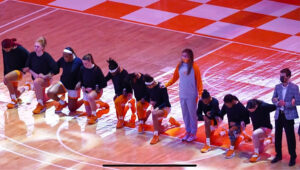
In a stunning and controversial move, the University of Texas revoked the scholarships of five student-athletes who kneel during the national anthem. The decision has sparked a fierce debate nationwide, highlighting the tension between free expression and institutional policies in academic and athletic environments.
The incident occurred during a recent sports event where the athletes knelt in silent protest, a gesture that has become symbolic of the fight against racial inequality and social injustice. In a powerful statement, the students declared, “Kneeling is respect. We do it before God.” The action, however, was met with swift and severe consequences from the university, leading to the loss of their scholarships.
The move by the University of Texas has ignited a nationwide conversation on the role of educational institutions in supporting or suppressing political and social activism among their students. Critics argue that such actions undermine the very principles of free speech and peaceful protest that are foundational to the educational experience.
Supporters of the university’s decision claim that sports should remain apolitical and that such protests are inappropriate in a setting meant to unify, not divide. However, the impact on these students’ academic and athletic futures raises significant concerns about the balance between maintaining order and respecting individual rights.
As the nation watches closely, the University of Texas stands at the center of a crucial debate that could redefine the boundaries of free expression in educational institutions. The repercussions of this incident are likely to be felt far beyond the campus, as it resonates with ongoing discussions about the intersection of sports, activism, and the role of universities in fostering or limiting such expressions.





